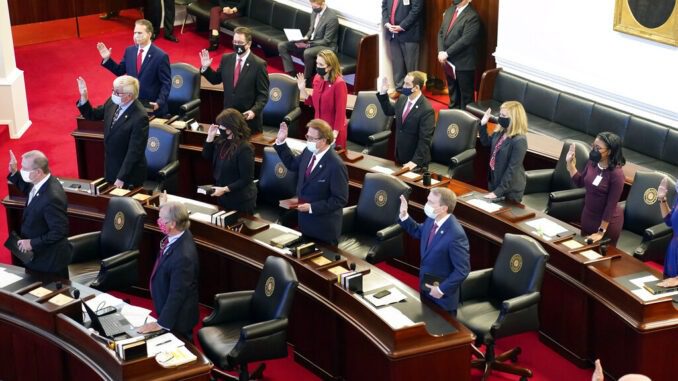
RALEIGH — Senate Bill 37, which seeks to return K-12 students to the classroom, passed both chambers of the General Assembly last week and was sent to Gov. Roy Cooper, who implied he may veto it.
The prior votes on the bill had revealed a partisan divide; however, the final votes were more bipartisan after a conference committee made some adjustments. The Senate passed the bill 31-16. Senate Republicans voted unanimously to pass the bill, joined by three Democrats, Sens. Clark and deViere, both representing Cumberland County, and Sen. Lowe (Forsyth). The remaining 16 Democrats in attendance voted no.
The House voted to pass it 77-42. Every single Republican voted yes on the measure, and 42 Democrats voted no. Eight Democrats voted yes with Republicans: Reps. Brockman (Guilford), Garrison (Granville), Graham (Robeson), John (Wake), Meyer (Orange), Richardson (Cumberland), Willingham (Edgecombe) and Wray (Halifax).
The governor has until Feb. 28 to veto or sign the bill. If he takes no action, it will become law without his signature, in accordance with state statute. As of Feb. 23, the bill remained on the governor’s desk with lawmakers calling for Cooper to sign the measure.
“Reopening schools is a national issue that impacts millions of families, especially working mothers. People are looking to their government for leadership, yet all they’re getting from the governor is inaction,” said Sen. Deanna Ballard (R-Watauga), the primary sponsor of the bill and co-chair of the Senate Education Committee. “Gov. Cooper needs to either sign or veto the bill; continuing to procrastinate does nothing but hold our kids back.”
“I am calling on Gov. Cooper to stop delaying and sign the bipartisan SB37 ‘In-Person Learning Choice For Families’ immediately,” said Rep. Erin Paré (R-Wake). “This bill provides families the option to return to in-person school. The reality is this: virtual learning isn’t working for a significant population of kids. The damage to children will continue unless we reopen schools for the kids that need it.”
“Medical experts and elected officials on both sides of the aisle agree that it is safe and vitally important for students to return to the classroom,” said Rep. John Bradford (R-Mecklenburg). “At the end of the day, it’s undeniable that the continued absence of children in classrooms is having a devastating effect on their development and mental health.”
On Feb. 17, the day he received the bill, Cooper issued a statement implying he may veto the bill.
“Children should be back in the classroom safely and I can sign this legislation if it adheres to DHHS health safety guidance for schools and protects the ability of state and local leaders to respond to emergencies. This bill currently falls short on both of these fronts,” said Cooper in the statement.
“There is broad agreement that the number one priority for North Carolinians today, the most important shared goal that we can accomplish together right now, is reopening public schools for struggling young students,” House Speaker Tim Moore (R-Kings Mountain) said in response to Cooper’s statement and possible veto.
Cooper’s claim does not line up with the bill text, which has cited the N.C. Department of Health and Human Services (NCDHHS) StrongSchoolsNC Toolkit guidance in its text since the first draft filing of the bill on Feb. 1.
“There’s no denying that schools will need to take precautions, that’s why we included specific language about the Strong Schools NC Public Health Toolkit, which was developed by NCDHHS,” said Ballard. “I believe it’s time to stop making excuses. Schools across the state and the nation have been operating safely for months. This bill is a workable, safe path forward for all students.”
Changes made in the conference report still cite the NCDHHS guidance and require districts to create a process for teachers and staff to “self-identify as high-risk” from COVID-19. That self-identification can include being a direct caretaker of a minor identified as high-risk. Using the StrongSchoolsNC toolkit, districts are encouraged to alter job duties for those staffers in a way that minimizes exposure or allow them to work remotely.
State Superintendent Catherine Truitt lent her support to the bill and commended the legislature for the bipartisan effort and for providing “local discretion” for school districts. She also noted that the bill is “in line DHHS health and safety guidance, requiring school districts to meet all stipulations as set forth in the StrongSchoolsNC Public Health Toolkit.”
Another complaint came from Sen. Natasha Marcus (D-Mecklenburg), who said the bill was an “unfunded mandate.” However, Republicans say the money is already in place from earlier this month when the General Assembly passed Senate Bill 36, a bill which made modifications to federal and state COVID-19 Relief funding. The bill, which Cooper signed, contains $1.6 billion for local school systems to use for reopening. Of that $1.6 billion, $140 million will go to Mecklenburg County Public schools.
Critics of Cooper’s lack of action to reopen schools have also pointed to the N.C. Association of Educators (NCAE), which has followed the lead of its parent organization, the National Education Association, and other teachers unions around the country, by opposing the reopening of schools. The NCAE ran a campaign to keep schools from open in the fall of 2020 called, “Our Schools, Our Say.” Early in 2021, the NCAE began pushing for vaccinations before returning educators to the classroom, while its leadership began a statewide tour in an RV, visiting “100 counties. 2500+ schools” in person. The NCAE has been one of Cooper’s major supporters since he first campaigned for governor in 2016.


